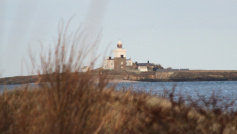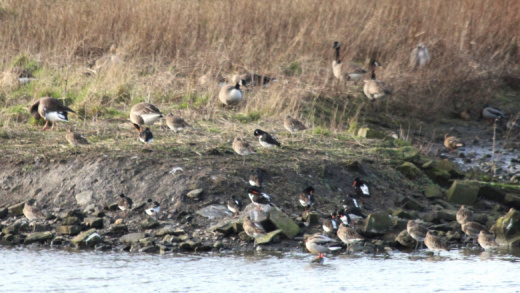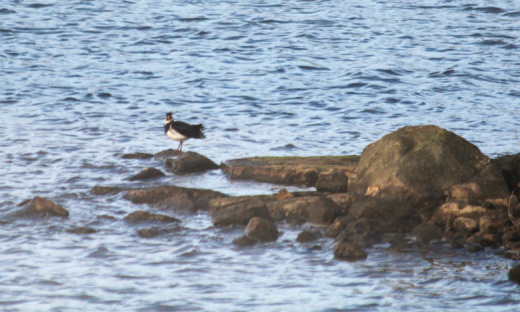Sands of time and tide on poetry walk at coastal nature reserve

Take a Bronze Age burial site, add a tsunami from Norway that saw off Doggerland, fossilised tree stumps, and tales of Grace Darling. Plus wonderful birds making the most of a reclaimed opencast mine site, and some fine, atmospheric poetry. These were the inspirational ingredients for a poetry walk around Northumberland Wildlife Trust’s Hauxley nature reserve on the North Sea coast on Saturday.
The walk was conducted by Northumberland poet and author Paul Mein, who has just been named the trust’s first poet in residence. Before we started our walk he confided that “this is a bit of an experiment” and modestly added that he was “no wildlife expert”. But he would be encouraging us “to look, to listen, to smell, and to take in the atmosphere”.
Pauline, a trust volunteer, accompanied us and provided us with tips and info about some of the birds we could see from the hides – greylag and Canada geese, shelduck, goldeneye, lapwing, oystercatcher, and heron, to name but a few - while Paul concentrated on reading his poems inspired by the area at various stopping points during the walk.

Another poem, set on Hauxley beach, “backlit by a lazy sun”, mentioned nearby wind turbines and “a Don Quixote landscape”. Another beach poem talked of how “once in a blue moon at Hauxley” freak tides revealed “Doggerland rocks”. He also conjured up “petrified footprints” from that long-inundated North Sea land that still wait to be discovered.

One of Paul's most touching poems, ‘Tide’, begins with these deceptive words about an often violent relationship :
I love you, the sea sighs,
tender for a time.
I love you too, the rock replies,
lullaby safe, ripple soothed.
At the end of the walk, helped by tea and coffee, we were invited by Paul to jot down a few lines inspired by our walk, which he intends to turn into a collaborative poem. Out of curiosity, I asked how many of the dozen or so people on the walk were already poets. Four put their hands up. But it seemed as though everyone was keen to contribute some words, if not whole poems.
An impressed Paul promised to circulate the poem he would put together from our jottings. His collection The language of sands contains a number of poems that he read on the walk - and his next guided tour of the Hauxley reserve, part of a local string of such reserves after mining ended in the area, will take place on 9 March. PS There are quite stunning views of birds on the nature reserve waters from the trust's Lookout cafe. Entry is free, although donations are welcomed, and there is a £2 parking charge.







Greg Freeman
Tue 13th Feb 2024 09:26
With Paul's permission, I'm posting this collaborative poem, plus poems produced on the day:
Poetry created by participants in the first poetry walk,
Hauxley, 27th. January 2024.
Collated by Paul Mein, Poet-in-Residence.
Low Hauxley; lapwings
facing sun and wind; turbines
spinning, croaking geese.
A stroll along a meandering path
with ‘see-through’ hedges revealing
the light on the sea; the sun beaming
amongst candy floss clouds,
a breath of wind carrying
the gaggling of geese, the whistle of widgeon.
Reflections, the shimmer of silver and steel,
sculptures of stones in metal cages;
shaggy herons stand aloof, lapwings sentinel
over geese, curlews, oyster catchers.
A willow split by storms still produces catkins;
golden dogwood branches, seed heads, teazles
guide the path, the brilliant yellow of gorse
lights the way. The island looks over
the church-like scene, peaceful, serene.
Three participants also created these poems in the
session following the walk.
Hauxley
Tern Hide, Skua Hide,
sea and hills side to side,
lapwings, oystercatchers
fluttering in the breeze,
a touch of nature,
guaranteed to please.
D.B
A picnic
Grace, disliking all the hype,
took herself off to sea,
preferring the company of family
in the quiet of the Hermitage, taking tea
with a brother also in the solitary
trade of lighthouse keeper;
quiet, already going out of fashion.
A.R.
Footprints
Past memories flood back, footprints track,
in the sand, two wet sandals stand.
A seven year old’s cries drowned
by curlews in high grey skies,
a bloody nose from diving in
a black “deep” rock pool,
sandals left in panic
for the incoming tide to hide.
Morning return, a reluctant ride -
“There dad, there, along that side”-
two wet sandals stand, full of sand,
socks neatly nuzzled,
a neighbour, a friend?
Memories back
footprints track.
D.C.